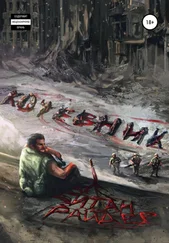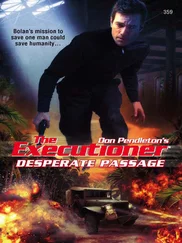Итан Рарик - Desperate Passage
Здесь есть возможность читать онлайн «Итан Рарик - Desperate Passage» весь текст электронной книги совершенно бесплатно (целиком полную версию без сокращений). В некоторых случаях можно слушать аудио, скачать через торрент в формате fb2 и присутствует краткое содержание. Жанр: Путешествия и география, на английском языке. Описание произведения, (предисловие) а так же отзывы посетителей доступны на портале библиотеки ЛибКат.
- Название:Desperate Passage
- Автор:
- Жанр:
- Год:неизвестен
- ISBN:нет данных
- Рейтинг книги:4 / 5. Голосов: 1
-
Избранное:Добавить в избранное
- Отзывы:
-
Ваша оценка:
- 80
- 1
- 2
- 3
- 4
- 5
Desperate Passage: краткое содержание, описание и аннотация
Предлагаем к чтению аннотацию, описание, краткое содержание или предисловие (зависит от того, что написал сам автор книги «Desperate Passage»). Если вы не нашли необходимую информацию о книге — напишите в комментариях, мы постараемся отыскать её.
Desperate Passage — читать онлайн бесплатно полную книгу (весь текст) целиком
Ниже представлен текст книги, разбитый по страницам. Система сохранения места последней прочитанной страницы, позволяет с удобством читать онлайн бесплатно книгу «Desperate Passage», без необходимости каждый раз заново искать на чём Вы остановились. Поставьте закладку, и сможете в любой момент перейти на страницу, на которой закончили чтение.
Интервал:
Закладка:
But they were making good distances across the tabletop flatlands of southern Nebraska, or at least good distances for a journey that occurred at the pace of an ox—fifteen to twenty miles a day. In early June they reached the first milestone of their trip: the Platte River. Too shallow for navigation, the Platte had been useless to trappers and fur traders, who used heavy keelboats to carry their supplies upriver and their spoils down. But for emigrants, the Platte was perfect—a gentle, unmistakable byway that pointed directly at an important pass in the Rocky Mountains. In the era of the wagon trains, the Platte, which pours down out of the Rockies and traverses the length of modern Nebraska before emptying into the Missouri, was the great highway of the West.
The Donners and the Reeds and their companions encountered it about at the site of modern-day Kearney, Nebraska, where they turned west and began working their way upstream along the south bank.
On June 12, Reed shot the first elk taken by the company. Hunters had seen some antelope, but the fleet-footed animals were too fast for most of the horses, and it was hard to get within range. As a result, the meat in the emigrants' diet had been mostly the salted supplies they had purchased in Independence, and the tender, fatty flesh of Reed's elk was welcome.
The next day, Reed lost a little of his glory when two other men rode back from a hunt with fresh buffalo steaks. Reaching the buffalo herds was always a notable occasion for the westward emigrants, many of whom had never seen the great animals before. "If we had found a gold mine," one man wrote during the Gold Rush, "there could not have been a greater commotion." Not surprisingly, Reed's fellow hunters were feted as heroes in camp, and in a letter back home Reed made plain his feelings about their success. The men were hailed as "the best buffalo hunters on the road—perfect 'stars.' " Reed, on the other hand, was thought a greenhorn, a "Sucker." The other men set out again, and the camp was full of talk that they would bring back more of the prized buffalo meat. When Reed organized his own party, almost no one wanted to go along. The snub rankled, and Reed decided to prove both himself and his horse:
And now, as perfectly green as I was I had to compete with old experienced hunters, and remove the stars from their brows; which was my greatest ambition, and in order too, that they might see that a Sucker had the best horse in the company, and the best and most daring horseman in the caravan.
So Reed mounted Glaucus, took three companions, and rode out until he found a buffalo herd so large that it darkened the plains. Disregarding the danger, he outran his friends and then rode straight into the herd. Within minutes, he had shot three buffalo—two bulls and a calf—and was so far ahead of his companions that he rode to a small knoll and sat in the grass to wait. He claimed to have counted 597 buffalo, although it's hard to imagine that he could really have kept track. From his perch, he watched his friends, whose balky horses refused to get close enough to the buffalo to bring one down. Reed had a laugh at their expense, then rode over and joined the hunt, chasing down a bull and shooting him. He shot one more calf, and then they set about the butchering, taking what meat they could carry and leaving the rest for the wolves, unmoved by the waste.
The fresh meat must have boosted spirits, but it was the acclaim that Reed cherished most. When they made it back to camp, he reported proudly, he was hailed as "the acknowledged hero of the day." Other men huddled around Glaucus and pronounced her the finest horse in the train. When he wrote home, Reed made sure to mention the compliment.
3
Vexatiously Slow
The pace could drive a man mad. The column creaked along at two miles an hour. Men could walk faster. They might stop by the trail to write a letter or butcher a fresh kill, and then an hour or two later they would rise and pocket their pencils or their hunting knives and, with a bit of brisk walking, catch the ponderously rolling wagons. Progress, one man said, was "vexatiously slow."
"Covered wagons" became the symbol of the journey, but in fact the rigs used by the emigrants were typically small and simple, not the huge Conestoga freight wagons of the movies. The beds were four or five feet wide and perhaps twice as long, a size that allowed them to maneuver through the canyons and forests and mountain passes the emigrants would eventually face. The running gear was simple: wooden axles and wheels, although strips of iron were wrapped around the wheels to serve as tires. There were no brakes. Going downhill, a wheel or two would be locked with a chain to take off some speed, or a felled tree would be dragged behind, the deadweight serving as a kind of land anchor. Typically, there was no seat for the "driver." Instead, he walked along beside the draft animals, controlling them with nothing but a whip and voice commands.
As a cover, canvas was stretched over bows of wood that had been soaked and bent. In a particularly strong wind, emigrants were known to take down the canopies to reduce the pressure and avoid damage or even being toppled. But almost always the canvas crowns shone out over the trains, a gleam of white against a stark prairie backdrop. That too produced a maritime analogy. As the wagons snaked along ridges and dropped to river crossings, winding with the aimless terrain, the wagon covers looked from a distance like the sails of ships. In time, the mirage produced a fanciful nickname for vehicles that were a thousand miles from the sea: prairie schooners.
The problem with the wagons was the engine. To pull great loads across the better part of two thousand miles, most emigrants used oxen, which were recommended over horses or mules in the tattered guidebooks bouncing in the wagon beds, books that had been thumbed through countless times during the months of preparation back on the farm. Oxen were cheaper, more durable, and said to be less likely to wander from camp. But the ox is not a fleet animal. Two miles an hour for a journey of two thousand miles meant a thousand hours on the trail, 125 days at eight hours a day, more than four months in all. And that ignored the inevitable—the odd day of rest, one of sickness, a busted axle or a shattered wheel. There would be rivers to ford, hills to climb, mud and sand where moving the wagons at two miles an hour was a fantasy even with eveiy ox on the team straining at the front and every man in the company pushing from the rear. There would be obstacles they could not yet imagine. On a journey into the unknown, perfect progress is perfectly impossible.
Edwin Bryant, the newspaperman, was one of those who rued the crawling tempo.
In the moving frontier village that was the wagon train, Bryant stood out—he had studied medicine and later worked as an editor at the Louisville Courier— and like all intellectuals he thought too much. Walking along, a troubling realization began to vex him. Some emigrants lacked the necessaiy impatience, the gut-level recognition of the potential disaster that delay might invite. There was no such thing as getting to California too early, but being too late might mean never getting there at all. Saving time at the early stages was like putting money in a bank. Later, when the inevitable difficulties and delays cropped up, the train could draw down its account and still make it over the final mountains in time. And as with any savings plan, the sooner you began investing, the greater your nest egg at the end. Yet there were those who wanted to pitch camp early and break it late. "I am beginning to feel alarmed at the tardiness of our movements," Bryant wrote, "and fearful that winter will find us in the snowy mountains of California."
Читать дальшеИнтервал:
Закладка:
Похожие книги на «Desperate Passage»
Представляем Вашему вниманию похожие книги на «Desperate Passage» списком для выбора. Мы отобрали схожую по названию и смыслу литературу в надежде предоставить читателям больше вариантов отыскать новые, интересные, ещё непрочитанные произведения.
Обсуждение, отзывы о книге «Desperate Passage» и просто собственные мнения читателей. Оставьте ваши комментарии, напишите, что Вы думаете о произведении, его смысле или главных героях. Укажите что конкретно понравилось, а что нет, и почему Вы так считаете.












